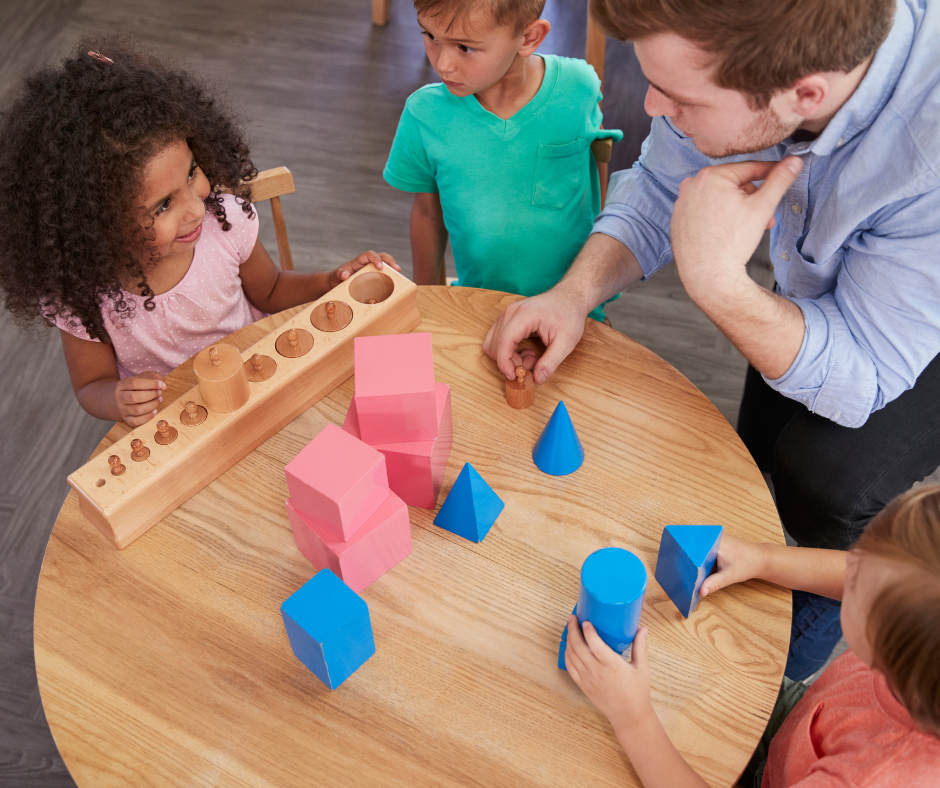Unleashing Child Creativity Through Montessori Play
Meet Kelly Somma, Monty Toys' Montessori Education Expert

Search
-
-
How Monty Toys Ut...
Jan 09, 2025 -
Embracing Nature ...
Aug 13, 2024
Archive
- January 2025
- August 2024
- June 2024
- May 2024

Unleashing Child Creativity Through Montessori Play
Do you know about the Montessori approach to education? It's based on the idea that play is crucial to a child's development and education. In the Montessori method, play is seen as the child's "work" because they learn the most through exploration and experimentation. Hold tight as we explore why play is more than a diversion.
What is the Montessori Approach?
Maria Montessori, an Italian doctor, and educator developed the Montessori approach to teaching more than a century ago. She thought that children thrived in settings that catered to their unique interests and needs.
Several central ideas form the basis of the Montessori approach. First, it promotes the child's autonomy and a desire to study on their terms. It also stresses the need to learn through all five senses, not only hearing, seeing, and reading. Last but not least, it advocates for concentrated periods during which kids can get work done.
The Montessori approach emphasizes the importance of the child's individuality, the child's stage of development, and the child's speed of growth. It's an approach that has persisted over the years and continues to awe teachers and parents.
The Montessori Approach to Play
In a Montessori classroom, children's play is the primary activity. When children play, they discover and learn about the world around them. In a Montessori classroom, children learn valuable lessons, foster their natural curiosity, and develop a lifelong passion for education while having fun. They partake in pursuits that heighten their awareness, inspire creativity, and challenge their logic. It's not just about playing about; it's also about fascinatingly learning new things.
The Montessori approach to play is distinct from more conventional methods.
Montessori allows children to take the reins during playtime, whereas traditional play centers around adult-led, structured activities. Having children make their activity selections promotes autonomy and internal drive. This type of play fosters children's independence and confidence as learners, laying the groundwork for a lifetime of education.
Purposeful, hands-on activities and materials characterize Montessori play. Montessori classrooms have been designed with items that encourage children to learn and explore at their own pace. Some sensory toys engage children's senses; independence-building tools and mathematical and linguistic manipulatives provide hands-on practice. These items are more than playthings; they are learning aids that help kids along their educational paths.
The Benefits of the Montessori Approach to Play
The Montessori way of playing has a lot of benefits.
- It works with the way children naturally learn. Letting kids pick their tasks based on their liking fosters a love of learning and encourages them to be curious and try new things.
- When kids are trusted to make decisions about their learning, they gain a sense of self-efficacy and think they can do things.
- It doesn't just focus on schoolwork; it also looks at physical, social, and mental development. Kids not only learn through fun, hands-on tasks, but they also learn essential life skills like problem-solving, creativity, and empathy.
The Montessori approach to play is a powerful way to help children grow and learn, preparing them for school and life.
Tips for Implementing the Montessori Approach to Play at Home
Want to use the Montessori approach of play in your own home? Here are some tips that will help you get started:
- Respect what your child likes: Pay attention to what your child is naturally interested in and allow them to play with these things.
- Create a child-friendly environment: Set up a place where your child can easily reach toys and materials to make it child-friendly. You can get them a Monty play shelf to ensure things are at their level and organized to make them feel like they can do things independently.
- Choose open-ended toys: Choose toys that can be used differently and encourage creativity, like a pink tower, Alphabet & Art Easel, or items for pretend play like Doctor's play set.
- Involve your child in daily tasks: Get your child involved in everyday activities. The Montessori approach teaches children valuable skills for life. Simple things like helping set the table or watering plants can be great ways to learn.
- Allow for uninterrupted play time: Let your kid play without interruptions. Instead of switching activities every few minutes, let your child do one thing for longer. This makes it easier to focus and learn something important.
Remember that the goal is to get kids excited about learning and to help them become more independent. Be patient, pay attention, and follow your child's lead. They know best how to learn.
Conclusion
The Montessori approach to playing can make a big difference in how your child learns and grows. It's not just a method; it's a way of thinking that supports children's natural curiosity, helps them become independent, and gives them a love of learning that will last a lifetime. With its focus on hands-on, self-directed play, it takes a holistic approach that encourages intellectual and social, mental, and physical growth.
Want to know how to get started? Remember to look at Monty Toys. We have a wide range of toys and games that are good for Montessori and are meant to interest kids in learning. You'll find everything you need to make a rich, engaging, and child-centered play space at home, from things that stimulate the senses to valuable tools for everyday life.
Remember that every child learns differently. Accept the process, do what they say, and watch as the power of play helps them reach their full potential. If you and your child try the Montessori approach, you might both fall in love with learning all over again.





